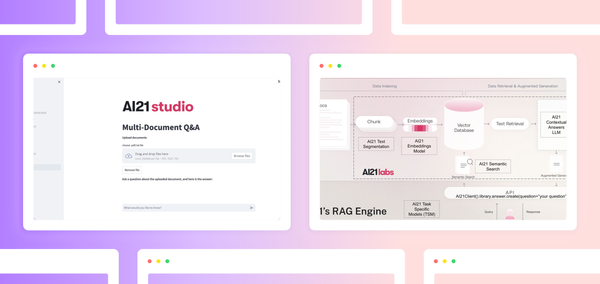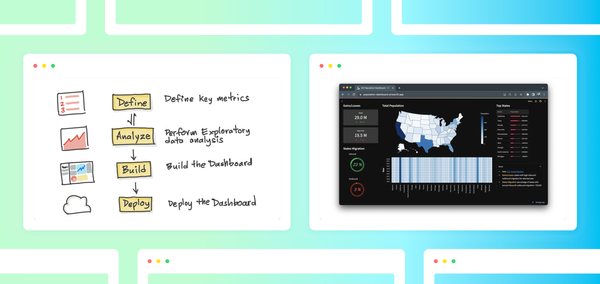Have you ever tried to build an app around a complex Machine Learning model, and found that rerunning the model every time the user changed an input value led to a less than ideal user experience? If so, it's likely because the parameters being supplied to your model use input widgets like st.text_input, st.number_input or st.slider and any time you change a widget the entire app is re-run.
To help solve this we're introducing a pair of commands called st.form and st.form_submit_button. This lets you batch input widgets together and submit the widget values with the click of a button — triggering only a single rerun of the entire app!
Check out this sample app which shows the new commands in action, but make sure to keep reading if you want to learn more about how it works.
Getting started
Forms are like any other Streamlit container and can be declared using the with statement:
# Using the "with" syntax
with st.form(key='my_form'):
text_input = st.text_input(label='Enter some text')
submit_button = st.form_submit_button(label='Submit')
Or, if you prefer, you can also use object notation:
# Declare a form and call methods directly on the returned object
form = st.form(key='my_form')
form.text_input(label='Enter some text')
submit_button = form.form_submit_button(label='Submit')
In your app, this creates a form with a submit button as follows:

What this does
Outside of forms, any time a user interacts with a widget the app's script is rerun. What st.form does is make it so users can interact with the widgets as much as they want, without causing a rerun! Instead, to update the app, the user should click on the form's submit button.

Form submit button
In the example above, notice that st.form_submit_button is in some ways similar to st.button, but differs in others:
Similarities
Just like the regular st.button, the submit button for a form, st.form_submit_button returns a boolean to indicate whether the form was submitted or not. This allows for building additional logic upon submit button. For e.g.
form = st.form(key='my-form')
name = form.text_input('Enter your name')
submit = form.form_submit_button('Submit')
st.write('Press submit to have your name printed below')
if submit:
st.write(f'hello {name}')
Differences
- A Form submit button is a special button which batch submits the state of the widgets contained in the form.
- A form must have an associated
st.form_submit_buttonotherwise Streamlit throws an error.
Form Features
st.form can be placed anywhere in a Streamlit app, you can even put columns inside of forms, or forms inside of columns, and everything will work as expected!
Forms inside columns
col1, col2 = st.beta_columns(2)
with col1:
with st.form('Form1'):
st.selectbox('Select flavor', ['Vanilla', 'Chocolate'], key=1)
st.slider(label='Select intensity', min_value=0, max_value=100, key=4)
submitted1 = st.form_submit_button('Submit 1')
with col2:
with st.form('Form2'):
st.selectbox('Select Topping', ['Almonds', 'Sprinkles'], key=2)
st.slider(label='Select Intensity', min_value=0, max_value=100, key=3)
submitted2 = st.form_submit_button('Submit 2')
Changing the contents of a form in the left column or submitting the left form does not impact the form on the right and vice versa.

Columns inside forms
with st.form(key='columns_in_form'):
cols = st.beta_columns(5)
for i, col in enumerate(cols):
col.selectbox(f'Make a Selection', ['click', 'or click'], key=i)
submitted = st.form_submit_button('Submit')

Changing the contents of any one of the select boxes does not impact the other select boxes and a rerun is triggered upon clicking the submit button.
Helpful errors and warnings
To help developers in certain situations where it detects an out-of-place or missing submit button, Streamlit will shows a warning or throws an exception in the following cases:
- If a
st.form_submit_buttonis defined without a form scope, Streamlit will throw an exception and stop execution. - If no submit button is defined, Streamlit will show a warning without interrupting the app flow.

Limitations and other notes
- An
st.formcannot be embedded inside anotherst.form. - Every form must have an associated
st.form_submit_button. - By definition,
st.buttons do not make much sense within a form. Forms are all about batching widget state together, but buttons are inherently stateless. So declaring anst.buttoninside a form will lead to an error. - Also by definition, interdependent widgets within a form are unlikely to be particularly useful. If you pass the output of
widget1into the input forwidget2inside a form, thenwidget2will only update towidget1's value when the form is submitted. - We are currently working on functionality that allows you to programmatically reset all widgets when the submit button is clicked. This should be added in an upcoming release.
Wrapping up
You can now add st.form and st.form_submit_button to your apps to help make them more responsive in just two lines of code!
So go ahead and upgrade Streamlit to version 0.81.0 today!
pip install --upgrade streamlit
We're excited to see how you'll use these new commands, so make sure to come share what you create on our forum or on Twitter. If you have any questions about these (or about Streamlit in general) let us know on the forum or in the comments below! 🎈





Comments
Continue the conversation in our forums →